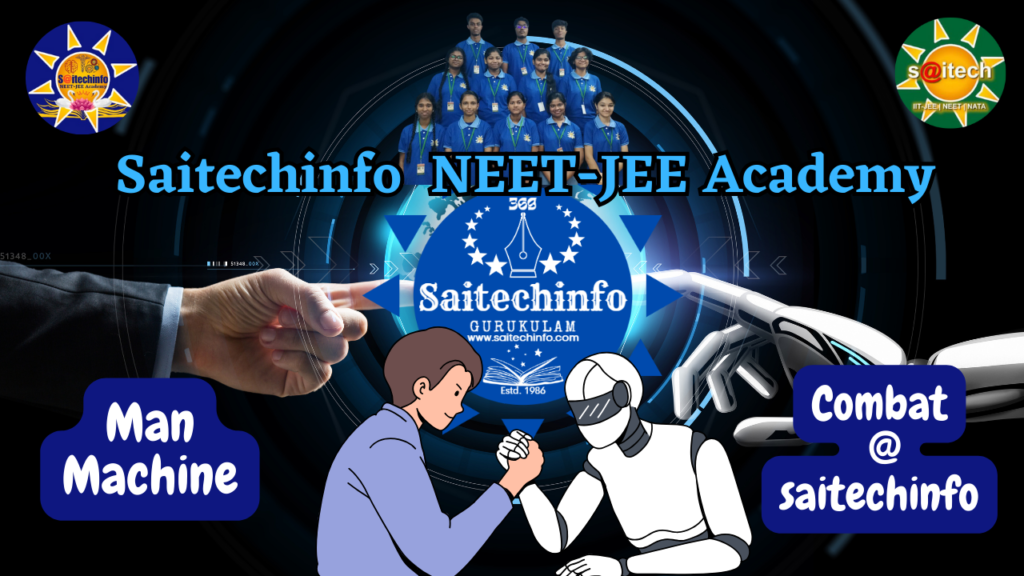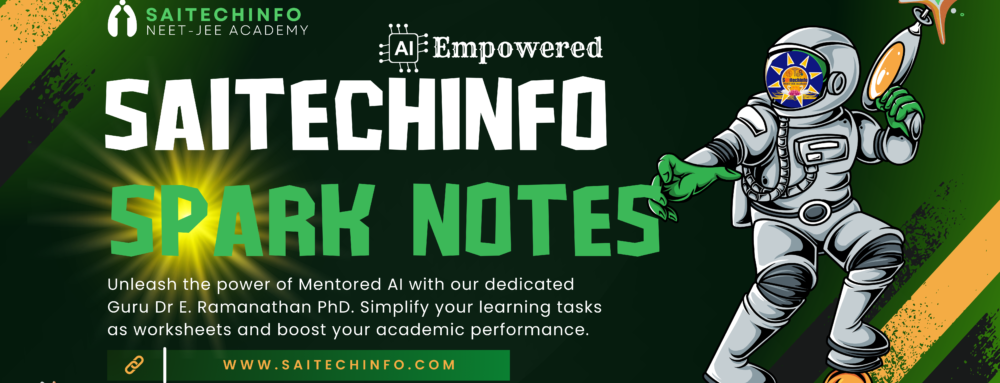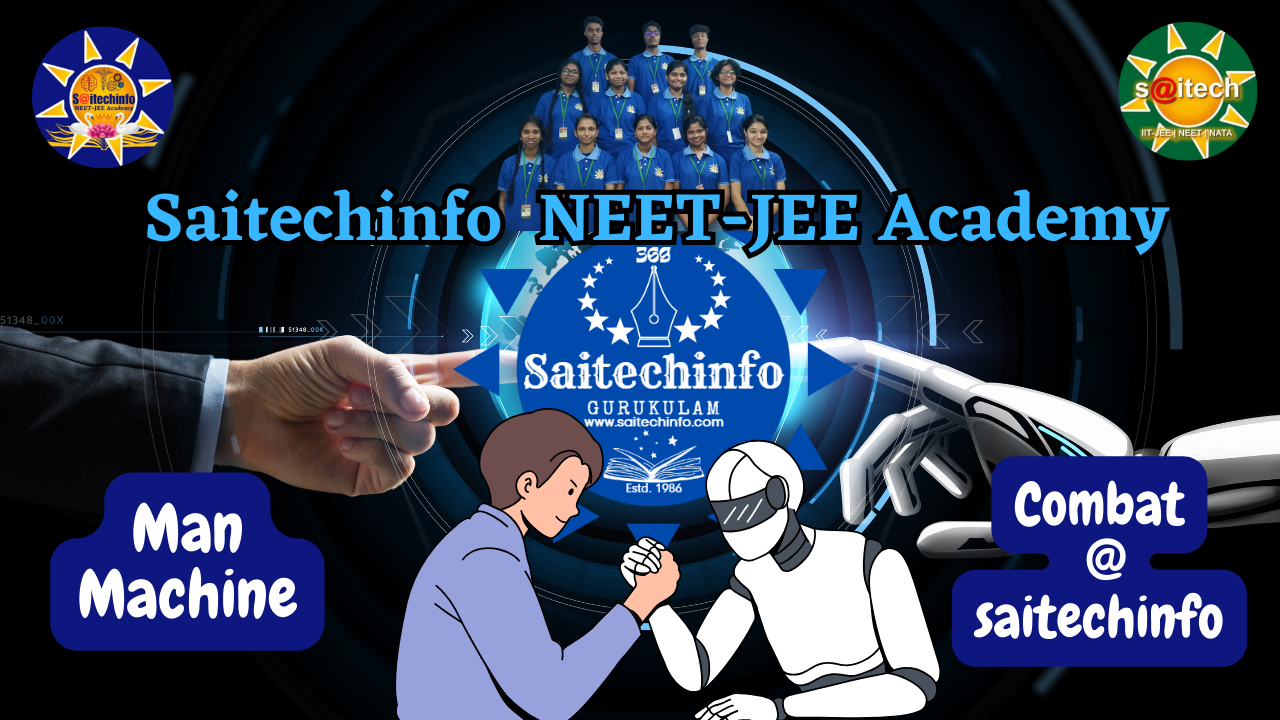Machine learning (ML) is poised to significantly transform conventional coaching for competitive exams like NEET and JEE in the future. Here’s how it could lead to changes:

- Personalized Learning Plans:
- ML algorithms can analyze individual learning patterns, strengths, and weaknesses, and then create highly customized study plans. These plans will adapt dynamically as the student’s progress evolves.
- Adaptive learning platforms will suggest specific topics or practice questions based on the student’s performance, enabling more efficient learning.
2. Automated Assessment and Feedback
- ML can enable instant grading of practice exams and assignments, providing immediate feedback. The feedback can be detailed, highlighting areas of improvement in real time.
- AI-based systems will offer suggestions for better strategies based on test-taking patterns, such as time management or how to approach particular question types.
3. Intelligent Practice Systems
- ML-driven systems will provide intelligent problem generation, where the difficulty level of practice questions can adjust based on a student’s current ability. As the student improves, the system can gradually increase complexity.
- These platforms will also track question-solving time and accuracy to offer data-driven insights into performance trends.
4. AI-Powered Tutors
- Virtual tutors powered by ML will simulate one-on-one human-like interactions. These AI tutors will help explain complex concepts, answer student queries, and provide tailored assistance round the clock.
- They can offer explanations in multiple formats (text, video, diagrams), adapting to the student’s preferred learning style.
5. Predictive Performance Analytics
- ML models will predict students’ future performance with great accuracy by analyzing past mock test results and learning behaviors. These insights will help students and educators understand potential outcomes and make adjustments well in advance.
- Students can be shown how far they are from achieving their goals, along with precise steps needed to bridge the gap.
6. Smart Study Material Curation
- ML algorithms can curate study materials from a vast database, choosing the most relevant resources for each student. For example, it can filter out unnecessary content and highlight critical concepts, saving time.
- This can include personalized video lectures, articles, and notes tailored to a student’s weak areas.
7. Gamification and Engagement
- ML can help incorporate game-like elements into study platforms, such as achievement levels, rewards, or challenges, which will increase student engagement and make the learning process more enjoyable.
8. Voice and Image Recognition for Learning
- With advanced voice recognition, students can ask questions verbally, and AI-powered tools will provide immediate answers or video explanations. Similarly, image recognition can allow students to upload handwritten problems, and the system can analyze and solve them.
9. Virtual Classroom Enhancements
- ML will enhance online coaching by tracking student engagement in virtual classrooms. If a student is losing focus or struggling with certain topics, real-time interventions like quizzes or targeted explanations can be triggered.
10. Data-Driven Decision Making for Teachers
- Teachers will be able to use ML tools to monitor the performance of entire batches and individual students, helping them identify when and where interventions are needed.
- ML systems can analyze which teaching methods work best for different groups of students and adjust instruction methods accordingly.
11. Efficient Doubt Clearing
- ML-driven chatbots or virtual assistants will help students clear doubts instantly. These systems will learn from previous student interactions to provide increasingly accurate and detailed answers over time.
12. Better Resource Allocation in Coaching Institutes
- Institutes can use ML to better allocate their resources, like scheduling the best faculty for specific subjects or batches based on the performance and learning needs of the students.
This transformation could make the coaching process more efficient, accessible, and tailored to individual needs, providing a more personalized and effective learning experience for students preparing for competitive exams like NEET and JEE.
AI Artificial Intelligence vs BI (Bio-Intelligence – Human)
Here’s a comparison between Machine Learning (ML) Based Learning and Mentor (Human) Based Learning across various dimensions:
1. Personalization
- Machine Learning:
- ML-driven platforms can analyze a student’s performance and offer personalized learning paths based on their strengths and weaknesses.
- Algorithms can adjust content difficulty dynamically, providing students with specific practice questions and resources tailored to their needs.
- Mentor Learning:
- A human mentor offers personal interaction, understanding the student’s learning style, emotional needs, and motivations. They can provide nuanced feedback that goes beyond data-driven insights.
- Personalized guidance is more subjective, relying on the mentor’s expertise and relationship with the student.
2. Feedback and Assessment
- Machine Learning:
- ML provides instant feedback, grading practice tests in real-time, and offering immediate insights into performance. It can highlight specific areas where the student is weak.
- It uses data-driven approaches to track progress over time, predict performance, and recommend study strategies.
- Mentor Learning:
- Mentors provide detailed, subjective feedback based on their assessment of a student’s work. They can identify gaps in understanding that may not be reflected by data alone.
- Mentors provide encouragement and emotional support during feedback, which can be crucial for students who need motivation.
3. Adaptability
- Machine Learning:
- ML systems can handle large amounts of data and quickly adapt based on a student’s learning pace. The adaptability is algorithmic, automatically offering more difficult problems as the student improves.
- However, ML systems are limited to the data they are trained on and may struggle with novel or unique learning challenges.
- Mentor Learning:
- Human mentors can adapt to the student’s psychological, emotional, and cognitive state in real-time. They can provide different explanations for the same concept, depending on the student’s understanding.
- Mentors can use creativity and intuition to address non-technical issues (stress, time management), which ML systems may overlook.
4. Consistency
- Machine Learning:
- ML platforms provide consistent teaching and evaluation methods. They can be highly scalable, ensuring that the same level of learning experience is provided to thousands of students.
- They do not experience fatigue or bias, ensuring equal attention to each student.
- Mentor Learning:
- Human mentors may have inconsistencies in their teaching approach due to personal bias, fatigue, or other external factors.
- However, mentors bring the human touch of empathy and understanding, which helps in maintaining student morale.
5. Emotion and Motivation
- Machine Learning:
- ML tools are limited in addressing emotional aspects of learning. They cannot sense when a student is feeling demotivated or stressed, though gamification and AI enhancements might help in keeping students engaged.
- Mentor Learning:
- Mentors play a critical role in emotionally supporting students, offering encouragement, and motivating them during challenging times. They can sense subtle emotional cues and adapt their approach accordingly.
- They help build trust and rapport, which can improve learning outcomes significantly for some students.
6. Real-Time Doubt Clearing
- Machine Learning:
- ML-driven systems provide immediate responses to questions. AI-powered chatbots and virtual assistants can answer common queries quickly, but their ability is limited to the knowledge they are trained on.
- They may struggle with complex, abstract, or creative questions that require deeper understanding or novel insights.
- Mentor Learning:
- Human mentors can address complex, abstract, or deeply conceptual doubts in real-time. They can provide explanations from multiple perspectives and relate problems to real-world experiences.
- They can also help with follow-up questions, providing deeper understanding through interactive dialogue.
7. Learning at Scale
- Machine Learning:
- ML systems can cater to millions of students simultaneously without sacrificing quality. They are highly scalable and can be accessed by students from any location.
- They provide cost-effective learning for large groups of students, making education more affordable and accessible.
- Mentor Learning:
- Mentors have a limited capacity to handle a certain number of students effectively. Quality of attention may decrease as the student-teacher ratio increases.
- One-on-one mentoring is resource-intensive and costly, which may limit access for some students.
8. Creativity and Critical Thinking
- Machine Learning:
- ML systems are limited to predefined problems and known solutions. They excel at providing structured practice but may fall short in promoting creative problem-solving and critical thinking skills.
- Mentor Learning:
- Mentors encourage students to think critically and approach problems creatively. They can challenge students with unconventional questions and help them develop out-of-the-box solutions.
9. Human Interaction and Social Skills
- Machine Learning:
- ML systems do not offer opportunities for developing interpersonal skills, teamwork, or group discussions.
- Learning becomes more individual-centric and isolated.
- Mentor Learning:
- Mentors facilitate group discussions, peer learning, and collaboration, which are important for developing communication skills, teamwork, and social learning.
- Interaction with peers and mentors also helps students gain confidence and improves their emotional intelligence.
10. Long-term Impact
- Machine Learning:
- ML platforms are efficient for knowledge acquisition, especially for standardized exams where data-driven practice is key.
- They may not offer the holistic growth that comes from learning experiences involving real-world problem-solving, ethical discussions, and life skills development.
- Mentor Learning:
- Mentors contribute to long-term personal and professional development by guiding students through not just academic content but also soft skills, life lessons, and decision-making abilities.
Conclusion:
- Machine Learning: Ideal for students who need structured, data-driven, and scalable solutions. Best for offering instant feedback, personalization, and cost-effective learning at scale.
- Mentor Learning: Critical for fostering creativity, critical thinking, emotional support, and holistic development. Best for those who benefit from human interaction, motivation, and personalized mentorship.
In Saitechinfo NEET-JEE Academy, blended learning models that combine both ML-driven learning platforms and human mentorship might provide the optimal educational experience, leveraging the strengths of both systems.




